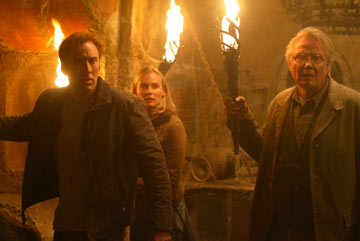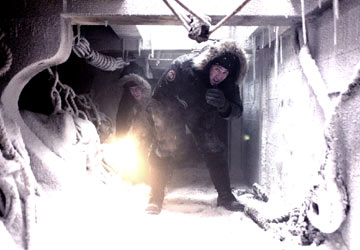Rating
-

Cast & Crew info:
Nicolas Cage
Ben Gates
Diane Kruger
Abigail Chase
Justin Bartha
Riley Poole
Sean Bean
Ian Howe
Jon Voight
Patrick Gates
Harvey Keitel
Sadusky
Christopher Plummer
John Adams Gates
Produced by Oren Aviv, Jerry Bruckheimer, Chad Oman,
Pat Sandston, Charles Segars, Christina Steinberg, Mike Stenson,
Jon Turteltaub and Barry H. Waldman; Directed by John
Turteltaub; Written by Cormac and Marianne Wibberley
Adventure (US); 2004;
Rated PG for action violence and some scary images;
Running Time: 100 Minutes
Official
Site
Domestic Release Date:
November 19, 2004
Review Uploaded
12/20/04 |
 Written
by DAVID KEYES Written
by DAVID KEYES If
you can call it entertaining, you're more than justified
in calling it good. This, at least, is how someone like
yours truly feels when it comes to "National Treasure,"
a sleeper hit that has endured so much critical backlash
since its release in November that one almost feels guilty
in disagreeing with the consensus. The audience, on the
other hand, seems to have seen a different film than what
the paid professionals have: an action vehicle that on one
hand is very silly, and on the other is extremely effective
in conveying the sheer thrill of its wacky situations (and
judging by the box office success, one would also argue
that it's probably worth repeat viewings). For fairness
sakes (and for the basic fact that I simply enjoyed what
I was seeing), I am obliged to leave all points of cynicism
out of this review. Few can argue that John Turteltaub's
ambitious vehicle is about as unbelievable as a film can
get, but if one is able to leave all sense of logic at the
door, it's also very hard not to have a darn good time in
the process.
Shamelessly styled
after the successful history-as-a-treasure-map approach
that is utilized in the novel "The Da Vinci Code,"
the movie is wall-to-wall mystery and intrigue, with an
Indiana Jones-like protagonist at the center whose own motivation
isn't as much about fortune and glory as it is about family
legacy. His is a tale that demands more than a standard
physical agility or basic cultural knowledge to stay afloat;
no, it also requires both an extensive insight into specifics
as well as a sense of patience. At the beginning of the
movie, young Ben Gates is told enigmatically by his grandfather
John Adams (Christopher Plummer) that their family has inherited
a hidden legacy passed down by the forefathers of the country.
Apparently, the last surviving signer of the Declaration
of Independence knew of a series of secret codes buried
in government documents that would lead someone to the location
of a great ancient treasure - and that knowledge, it is
assumed, was passed down quite inadvertently to a member
of the Gates clan. For generations, he admits, the men of
their family have searched long and hard for this supposed
ancient treasure but have always come up empty-handed. Recent
example: Ben's own father Patrick (Jon Voight), who has
grown so impatient by the search that he no longer believes
in the legend; it now just an assumption that the whole
thing was invented to keep fool-hearted people like himself
occupied. Ben, on the other hand, believes his grandfather's
assertions without any sort of challenge, and lays claim
to the treasure himself for when he is older and wiser.
Flash forward
several years. Ben (now played by Nicholas Cage) is off
scouring the arctic, looking for a famous lost ship frozen
in the ice that may (or may not) harbor the notorious treasure
that has eluded so many people over so many centuries. His
partners, Ian (Sean Bean) and Riley (Justin Bartha), appear
as if they are just there for the sake of keeping each other
company, but the fact remains that Ben has, in just a couple
of short movie minutes, already gotten closer to the treasure
than any of his predecessors, and once their guide actually
locates what he came for, their eyes light up as if all
of their dreams have been realized. Unfortunately, the ship
they find doesn't actually harbor the treasure itself as
they had hoped - actually, all it contains is another clue,
which predictably leads them into an entirely new direction.
The movie doesn't take long to indicate that this is a repeating
offense, either; locations change and new clues pop up so
often that it becomes the picture's central gimmick, and
the treasure itself isn't so much a climax as it is an epilogue
to countless exhausting journeys across the globe.
The primary plot
device is focused on that first riddle found in the arctic;
through a careful study of the words scribbled on a sheet
of paper, Ben comes to the realization that a treasure map,
revealing the location of what he so desires, may have been
scrawled in invisible ink on the back of the Declaration
of Independence itself. But considering the precious nature
of that government document, he also doesn't want to risk
stealing it either, especially considering how rough it
would be to do so (not to mention the possible repercussions
that would result). Needless to say, his comrade Ian strongly
disagrees with that assertion, and in a mad act of greed
he sabotages both Ben and Riley and decides to orchestrate
his own plan for stealing the document, cutting them out
entirely of the potential payoff.
 What
would a good adventurer be, however, if he just stood idly
by and watched a new foe try to steal something so big from
underneath him? The heroes conform to the notion that the
only plausible scenario in this case (both to find the treasure
as well as protect the Declaration of Independence from
potential harm) is to steal it for themselves. That is not
a plan, mind you, that they share openly with government
employee Abigail Chase (Diane Kruger), whom they meet with
early on after Ian's betrayal to explain the situation.
Ah, but she's a lot smarter than either of them realize,
too, and though the plot to steal such a precious artifact
is far-fetched to begin with considering the amount of security
involved, she reassesses the situation when she spots Ben
at the public archive during a private party one evening,
believing he is the one behind the possible heist which
he warned her about earlier. By the time is all said and
done, though, her conclusion arrives too late and the document
is seized from its casing. It certainly doesn't stop her
from purposely interjecting herself into their plans (hey,
would you leave an artifact like that with the thieves?),
but after a few good run-ins with the determined Ian and
his posse of thugs, her dilemma becomes not how to get the
document back, but who to trust more in handling it outside
of the archives. What
would a good adventurer be, however, if he just stood idly
by and watched a new foe try to steal something so big from
underneath him? The heroes conform to the notion that the
only plausible scenario in this case (both to find the treasure
as well as protect the Declaration of Independence from
potential harm) is to steal it for themselves. That is not
a plan, mind you, that they share openly with government
employee Abigail Chase (Diane Kruger), whom they meet with
early on after Ian's betrayal to explain the situation.
Ah, but she's a lot smarter than either of them realize,
too, and though the plot to steal such a precious artifact
is far-fetched to begin with considering the amount of security
involved, she reassesses the situation when she spots Ben
at the public archive during a private party one evening,
believing he is the one behind the possible heist which
he warned her about earlier. By the time is all said and
done, though, her conclusion arrives too late and the document
is seized from its casing. It certainly doesn't stop her
from purposely interjecting herself into their plans (hey,
would you leave an artifact like that with the thieves?),
but after a few good run-ins with the determined Ian and
his posse of thugs, her dilemma becomes not how to get the
document back, but who to trust more in handling it outside
of the archives.
This is a story
arc that requires several more paragraphs for a thorough
explanation, but part of "National Treasure's"
undeniable charm is that it doesn't want to stay on any
specific plot point; instead, it just creates new challenges
after pre-existing ones are resolved. The script's utilization
of elaborate puzzle pieces is generally clever, even though
no one with any extensive historical knowledge in the real
world could ever hope to solve some of these riddles that
are thrown around. But the film isn't about us believing
those details; it is about characters that accept them for
themselves, and become immersed in all sorts of globe-trotting
mischief as a result. In that regard, Turteltaub's picture
is both engaging and zealous, fueled by a constant rush
of adrenaline that, despite going occasionally over-the-top,
seldom forgets to deliver a satisfactory payoff. Having
said that, the movie is also short on big action sequences,
and though some would consider that a severe misstep for
something as high-spirited as this, I found it to be rather
refreshing. The real excitement here is in watching two
competing factions play cat-and-mouse with each other as
they inch closer towards finding the lost treasure. Call
me a primitive thinker, but a good clean chase scene on
foot is much more amusing than a bunch of car crashes and
explosions.
If I hesitate
in giving the film better marks, it's just because, as earlier
suggested, the sheer silliness of the material leaves no
room for the endeavor to resonate beyond cheap thrills.
It's entirely hokey. And yet cheap thrills are thrills all
the same, so it is also impossible to say that the movie
is disposable, too. Part of the stigma associated with "National
Treasure's" critics, in fact, may simply come down
to the notion that no one is in the mood for those kinds
of cheap thrills right now, especially with the onslaught
of serious-themed awards contenders that tend to fill theaters
in the last two months of a year. Would they enjoy the picture
if it were released during the summer months instead? Perhaps.
But in either case, it's the audience who has ultimately
spoken in favor of "National Treasure." And in
this particular instance, that's a majority rule I am contented
to be a part of.
© 2004, David Keyes, Cinemaphile.org.
Please e-mail the author here
if the above review contains any spelling or grammar mistakes. |




